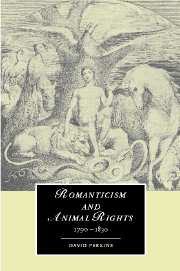Book contents
- Frontmatter
- Contents
- Preface
- Acknowledgments
- 1 In the beginning of animal rights
- 2 Grounds of argument
- 3 Keeping pets: William Cowper and his hares
- 4 Barbarian pleasures: against hunting
- 5 Savage amusements of the poor: John Clare's badger sonnets
- 6 Work animals, slaves, servants: Coleridge's young ass
- 7 The slaughterhouse and the kitchen: Charles Lamb's “Dissertation upon Roast Pig”
- 8 Caged birds and wild
- Notes
- Bibliographical essay
- Index
- CAMBRIDGE STUDIES IN ROMANTICISM
2 - Grounds of argument
Published online by Cambridge University Press: 22 September 2009
- Frontmatter
- Contents
- Preface
- Acknowledgments
- 1 In the beginning of animal rights
- 2 Grounds of argument
- 3 Keeping pets: William Cowper and his hares
- 4 Barbarian pleasures: against hunting
- 5 Savage amusements of the poor: John Clare's badger sonnets
- 6 Work animals, slaves, servants: Coleridge's young ass
- 7 The slaughterhouse and the kitchen: Charles Lamb's “Dissertation upon Roast Pig”
- 8 Caged birds and wild
- Notes
- Bibliographical essay
- Index
- CAMBRIDGE STUDIES IN ROMANTICISM
Summary
This chapter surveys the arguments that were made on behalf of animals two hundred years ago. They were similar to our own, and in some cases very dissimilar. Cruelty to animals had been condemned by moralists in classical antiquity, the middle ages, and the early modern period, though the reason was seldom sympathy for animals. The impulses it expresses were thought to be dangerous to society, to other human beings. Francis Hutcheson, professor of moral philosophy at Glasgow university, echoed the traditional statements in 1755: “frequent cruelty to brutes may produce such a bad habit of mind as may break out in like treatment of our fellows.” Thanks to John Locke, whose psychological theories were widely accepted, the argument acquired a developmental perspective. Giving close attention to the origin of ideas and attitudes in early experience, Locke urged that “Children should from the beginning be bred up in abhorrence of killing and tormenting any living creature … and indeed, I think people from their cradle should be tender to all sensible creatures.” He saw a close connection between childish “Tormenting and Killing of Beasts” and adult hardness of heart toward our “own kind.”
Locke's writings helped inspire an unremitting stream of warnings: childish cruelty must not be tolerated, not to insects, not to birds, not to small animals, not to pets, not to each other.
- Type
- Chapter
- Information
- Romanticism and Animal Rights , pp. 20 - 43Publisher: Cambridge University PressPrint publication year: 2003

